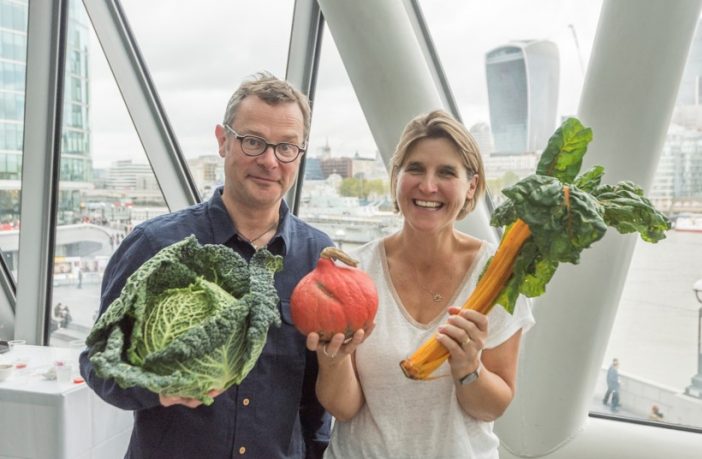The numbers of overweight and obese children are rising as they move through primary school. This echoes the increasing number of obese adults in the UK, which has nearly doubled in the last 25 years. But is obesity inevitable as we grow older?
OU academic Dr Joan Simons has worked closely with the BBC to develop two programmes examining obesity in Britain today.
Britain’s Fat Fight with Hugh Fearnley-Whittingstall began on Wednesday 25 April on BBC One and saw Hugh confronting the UK’s health crisis by examining how consumers are misled by packaging and portion sizes, and bombarded by junk food advertising. Watch episodes one and two on BBC iPlayer and tune in to episode three on Wednesday 9 May at 9pm (10:45pm in Scotland).
The Truth About Obesity was a one-off episode on BBC One on Thursday 26 April and looked at the latest scientific research on obesity. Watch it now on BBC iPlayer.
Dr Simons explains that despite the growing numbers of school children who are obese, it is not inevitable and there are things we can do about it:
“Obesity has been rising in adults for more than thirty years, but worryingly, we are now also seeing it rise in school children.
More children are now overweight or obese
The National Child Measurement Programme has found that almost a quarter of four to five year old children in reception year, and over a third of ten to eleven year old children in year six were measured as obese or overweight. The number of overweight and obese children is therefore doubling as they move through primary school.
And as with adults, obesity can also have a negative impact on children, leading to both physical and mental health issues, affecting self-esteem and even bullying.
A parental influence
It’s clear that adult and childhood obesity are linked, with a child’s weight being influenced by their parents.
The question is, is this due to genes, culture or their environment?
It’s not a simple answer, and it’s likely to be a mixture of all three.
Scientists have found that a poor environment in the womb, which can be influenced by factors such as their mother’s diet, exercise and stress, can predispose a growing baby to be more susceptible to conditions such as heart diseases and obesity. This is called prenatal programming, and how genes are influenced by their environment is called epigenetics. Scientists have found a link between obese pregnant women and the likelihood of their baby growing up to be obese, and are made worse by having a poor diet and fitness level later in life.
On top of that, the world we live in influences what we eat and how often we do exercise. ‘Obesogenic environments’ encourage us to eat too many calories and not be physically active, such as areas with many fast food outlets where it is harder to make healthier choices. Changing the food environment and making towns and cities healthier could help combat obesity.
How active or ‘sporty’ your parents and your family are will also influence your physical activity as a child.
So it’s not as simple as just having an ‘obese gene’ – occasionally there is a gene, but the environment, both in the womb and your family world around you, are also important factors.
The importance of the world around us
In adults, the environment we live in influences the rate of obesity. This is also true for children.
For example, in areas of high deprivation, children have higher rates of obesity. The National Child Measurement Programme found children in year six from the most deprived areas of England were twice as likely to be obese as those living in the least deprived areas.
And it appears we are becoming immune to it – with the gradual rise in obesity, it has become more accepted. In fact, the majority of obese adults in the UK don’t recognise themselves as obese, or even very overweight. Parents of overweight and obese children also believe their child is the right weight.
Public Health England believes this perceptions must change if we are to tackle obesity:
So, if one third of children are obese and one quarter of adults are obese, and that both genes and the world we live in play a part, what can we do about it? Is it inevitable that this trend will continue?
Tackling Obesity
Until recently, obesity has been a medical concern, with most interventions focusing on treatment or modifying a person’s behaviour. But gradually, people are realising obesity is not a problem of individual people, but a bigger societal problem.
As a result, measures are now aiming to tackle obesity and being overweight at a population level.
Some of the strategies for controlling childhood obesity include:
- Regulating food marketing
- Introducing a ‘fat tax’ on high-fat, high-sugar food and beverages, particularly those aimed at children and young people
- Promoting healthy eating and lifestyles in schools
- Improving offerings for children, reducing portion sizes and making healthy choices more attractive in restaurants, food and beverage companies
The media can also play a huge role in reinforcing healthy lifestyle choices through advertising, television, film and the internet – and we’ve recently seen Jamie Oliver launch a campaign to restrict junk food adverts targeting children, supported by Dr Rangan Chatterjee, the BBC’s ‘Doctor in the House’. In Britain’s Fat Fight, Hugh Fearnley-Whittingstall explores the misleading information on children’s breakfast cereals, as well as the portion sizes and sugar content in children’s meals provided by a range of restaurants who attract families.
We’ll see over time how effective these measures and campaigns can be.
What can I do to help?
It’s often hard to convince children to eat better, particularly fussy eaters! But there are lots of things you can do to keep your children, nieces, nephews, grandchildren healthier and more active.
- Sit together as a family at mealtimes when you can
- Get children involved in cooking, so they know the ingredients in their food
- Cook from scratch whenever you can, rather than eat ready meals
- Try and ensure they have five portions of fruit and vegetables every day
- Try and get them to develop a taste of a variety of foods as they grow up
Find out more
Find out more about these programmes and how the OU is involved
Find out why obesity is such a challenge
Learn more about the science of healthy eating by completing our free online course
This article is adapted from Joan Simons’ article



